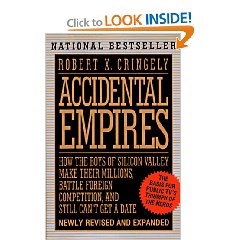April 7, 2000
Pierre Levy
This dude is a heavy hitter, and it says a lot that this one made it over the water from the French original. Clearly a modern day successor to Jacques Ellul (The Technological Society) and before him Pierre Teilhard de Chardin. Levy begins with the premise that the prosperity of any nation or other entity depends on their ability to navigate the knowledge space, and the corollary proposition that the knowledge space will displace the spaces of the (natural) earth, (political) territory, or (economic) commodity. He is acutely conscious of the evil of power, and hopes that collective intelligence will negate such power. He ends with a warning regarding our construction of the ultimate labyrinth, cyberspace, where we must refine the architecture in support of freedom, or lose control of cyberspace to power and the evil that power brings with it.








